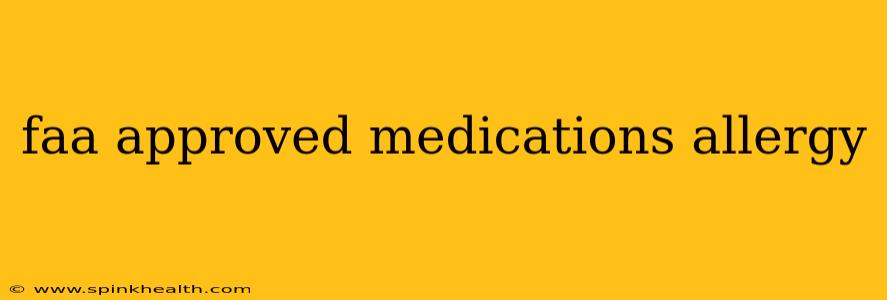Flying with allergies can be a daunting experience. The confined space, recycled air, and potential exposure to airborne allergens can trigger uncomfortable, and sometimes even dangerous, reactions. Knowing which medications are safe to take before, during, and after a flight, and having them FAA-approved, is crucial for a smooth journey. This isn't just about comfort; it's about safety. This guide delves into the world of FAA-approved allergy medications, providing insights to help you plan your next trip with confidence.
Our story begins with Sarah, a seasoned traveler with severe seasonal allergies. She'd always dreaded flying, the uncertainty of an allergic reaction looming over every trip. One particularly harrowing flight, punctuated by sneezing fits and itchy eyes, convinced her she needed a better plan. This is where understanding FAA regulations and allergy management becomes paramount. Let's explore the intricacies together.
What are the FAA's regulations on medications and flying?
The Federal Aviation Administration (FAA) doesn't explicitly endorse or prohibit specific allergy medications. However, they are concerned with the potential impact of medication on pilot performance and passenger safety. This is why understanding the potential side effects of any medication you're taking, especially those that could cause drowsiness, impaired judgment, or other reactions, is crucial before flying. The key is to choose medications that are less likely to interfere with your ability to function normally and safely.
What allergy medications are generally considered safe for flying?
Many common allergy medications are generally considered safe for air travel, provided they don't induce drowsiness or impair your ability to manage yourself. These often include:
- Non-drowsy antihistamines: Cetirizine (Zyrtec), fexofenadine (Allegra), and loratadine (Claritin) are popular choices for their effectiveness without the sedative effects. However, always check the label and be aware of any potential side effects, even if rare.
- Intranasal corticosteroids: These nasal sprays, such as fluticasone (Flonase) and mometasone (Nasonex), are effective in reducing nasal inflammation and are generally considered safe for air travel.
- Eye drops: Antihistamine eye drops can provide relief from itchy, watery eyes.
It's essential to note that even these generally safe medications can have individual effects. What works perfectly for one person might cause slight drowsiness or other minor side effects in another. Always consult your doctor or pharmacist before taking any medication, especially if you have pre-existing conditions or are taking other medications.
Can I take a drowsy antihistamine before flying?
Yes, but with caution. Drowsy antihistamines like diphenhydramine (Benadryl) can be effective in treating allergy symptoms, but their sedative effects could be problematic, particularly if you are a pilot or need to be alert during the flight. If you do choose to take a drowsy antihistamine, it's best to take it well before your flight, ideally at night before you depart to allow for the drug's full effect and for any side effects to subside. This is also a good time to discuss your options with your healthcare provider.
What if I have a severe allergic reaction during a flight?
Having a severe allergic reaction at 30,000 feet is a serious concern. Always inform flight attendants of your allergy and carry an epinephrine auto-injector (like an EpiPen) if prescribed by your doctor. They are trained to handle medical emergencies and can assist in managing your reaction. Have a clear and concise plan with your doctor for managing severe reactions, including what to do on an airplane.
Are there any allergy medications I should avoid before flying?
Medications that cause significant drowsiness, impair judgment, or have unpredictable side effects should generally be avoided before flying. Always consult your doctor or pharmacist before taking any medication, particularly if you have concerns about its effects on your ability to function safely during air travel.
How can I prepare for flying with allergies?
Preparation is key. Besides medication, consider these tips:
- Pre-flight consultation: Discuss your allergy plan with your doctor before flying.
- Pack allergy essentials: Carry your medications, a list of your allergies, and your doctor's contact information.
- Consider air purifiers: Personal air purifiers can help reduce exposure to allergens.
- Minimize exposure: Avoid known allergens as much as possible during travel.
Flying with allergies doesn't have to be a stressful experience. With proper planning, understanding of your medication options, and open communication with your healthcare provider and flight crew, you can enjoy a safe and comfortable journey. Remember, Sarah's harrowing experiences led to a much more informed and confident approach to travel. You, too, can embrace your journey with peace of mind.

